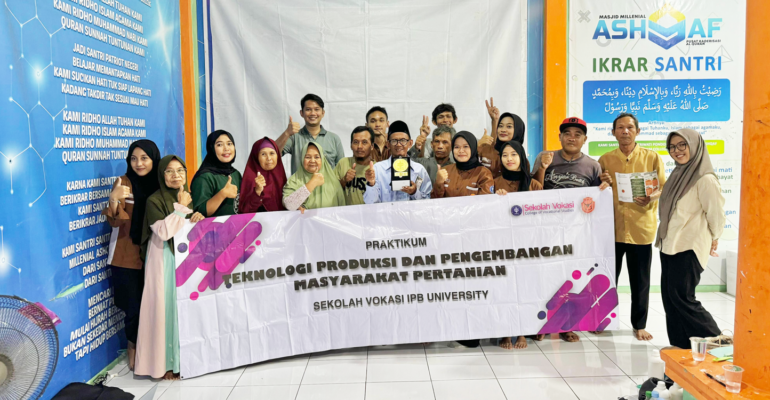The Vocational School Students of IPB University Held a Local Microorganism Organic Fertilizer Counseling in Bantasari Village, Bogor

Students of Production Technology and Development of Agricultural Communities Department in IPB University’s Vocational School held a counselling about the local microorganism (MOL) organic fertilizer in Bantasari Village, Bogor some time ago. This activity is a part of a community service program which aims to increase farmers’ comprehension and skills in using environmentally friendly agricultural technology.
This activity was held in Pondok Tahfidz Ashqof, Bantasari Village Rancabungur Subdistrict, Bogor Regency and attended by 10 members of the farmer group. The farmers came to gain knowledge about the benefit and the procedure on how to use local microorganism (MOL) organic fertilizer.
Activity supervisor, Dr Leonard Dharmawan, hoped the activity could be a two-way learning venue, in which not only the community learns from the students, but also the students could learn from the community. “I hope this activity not only becomes an opportunity for the community to learn, but also for the students to gain knowledge from experience and the community’s local culture,” Dr Leonard stated.
Dr Leonard adds that this relationship needs to be continually upgraded especially to give bigger benefits to the community. “In the future, this relationship must further be upgraded to provide great benefits to the community,” he added. Dhiva Aulia, one of IPB University student explains that the local microorganism (MOL) organic fertilizer is an effective environmentally friendly solution to increase agricultural productivity. She also hopes that this counseling could encourage farmers to be more aware of the importance of sustainable agricultural technology.
“We hope that with this counseling, the farmers could be more aware of the importance of sustainable agricultural technology usage,” Dhiva adds.
Other than giving theoretical knowledge, IPB University students team also did a live demonstration on how to use local microorganism (MOL) organic fertilizer for kinds of plants that are often planted in that village. The IPB University students also engaged with the farmers to discuss interactively ensuring better understanding.
One of the farmers, Sri Sumini, explained, “We’re really grateful to the students of IPB University who gave us knowledge about the local microorganism (MOL) organic fertilizer. We are sure that this knowledge will become very useful to increase our harvest,” Sri Sumini stated.
This counseling that was held by the IPB University Vocational School Students shows the commitment of IPB University in giving real contribution to the rural community through the application of science and technology they learned. Hopefully this activity would be a great beginning in reaching more sustainable and competitive agriculture in society. (TBO/ASW/ra) (IAAS/STD)



